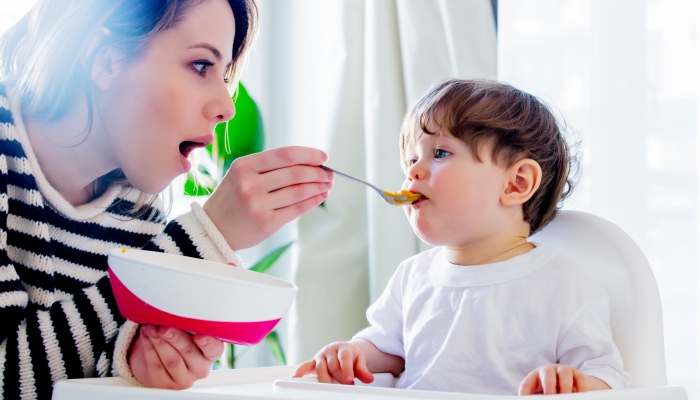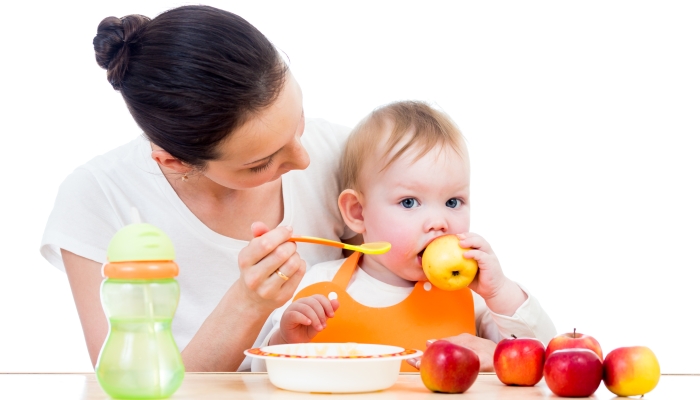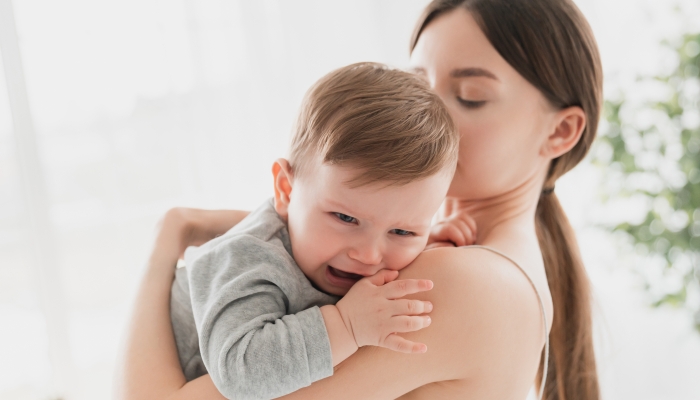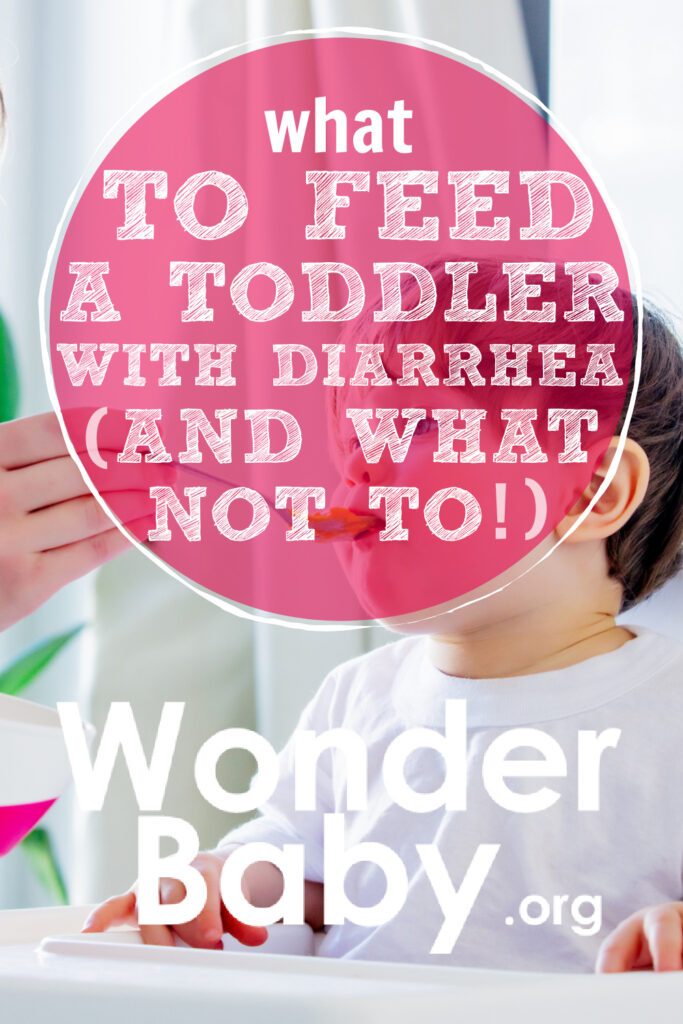What to Feed a Toddler With Diarrhea (and What Not to!)

- Diarrhea is one of the most common toddler conditions.
- Diarrhea in toddlers is usually caused by a gastrointestinal virus.
- Dehydration is a potentially dangerous side effect of diarrhea.
- Most children should resume a regular diet as soon as possible after getting sick.
- The BRAT diet is no longer recommended by pediatricians as a treatment for gastrointestinal illnesses.
When your child has stomach pains and non stop diaper blowouts, it can be hard to know what to do. Mothers often worry about their child’s nutrition and worry when their toddler doesn’t seem to be eating enough.
This becomes even more difficult when the child has a gastrointestinal illness, because you have to decide between keeping up with a nutritious diet, allowing their children to eat anything that they’ll put in their bellies, or just waiting it out until their children regain their normal appetite.
Knowing what to feed a toddler with diarrhea (and what not to!) can help them to feel better and give you some peace of mind.
Diarrhea in Toddlers: What Parents Need to Know
Few things are worse than a huge diaper blowout. If your toddler is having frequent bowel movements with watery stools, you have more than just cleanup to worry about.
Toddler diarrhea is one of the most common conditions bringing children and their parents to the doctor. While most of the time your child’s diarrhea will resolve in just a few days, some severe or chronic diarrhea can lead to dangerous problems like dehydration that may require treatment by a pediatrician.
What to Feed a Toddler With Diarrhea

Keep in mind that your child’s diarrhea is much more likely to cause dehydration than malnutrition. It’s much more important to ensure that your child has enough fluid intake while they are sick. If they do get hungry, you can feed them a bland diet.
Fruit Juices and Sports Drinks
According to the Cleveland Clinic, you should keep plenty of salty foods and sugary beverages in your child’s diet when they have diarrhea. This is because salt absorbs water and can help prevent dehydration. Sugar helps your body absorb and use the salt.
With any illness, drinking enough fluids is essential. Even if your child has to stop eating regular foods for a while, make sure their fluid intake stays up by encouraging them to drink juice or electrolyte solutions.
Low-Fiber Foods
Low-fiber foods can slow down the gut and help to slow your toddler’s diarrhea. Foods like white bread, white rice, jell-o, and other easy-to-digest foods are often the cause of chronic constipation in adults. While research suggests that low-fiber foods are not the best foods for a healthy diet, they are great foods for slowing diarrhea and correcting loose stools.
BRAT diet
The BRAT diet (bananas, rice, applesauce, toast) has become less popular among the American Academy of Pediatrics, but some pediatricians and moms still recommend using it for toddler diarrhea.
Generally, the BRAT diet works well for short-term diarrhea caused by viruses or eating spoiled food, but it does not provide enough nutrition to be given to children with long-term functional gastrointestinal disorders.
Regular Diet
If your child feels hungry, try to transition them back to their regular diet as soon as possible. Start to feed them regular breakfast, lunches, and dinners.
What Not to Feed a Toddler With Diarrhea
When your child is suffering from abdominal pain, vomiting, or diarrhea, the last thing you want to do is make their diarrhea worse. The following foods should be avoided for children with diarrhea.
Fried Foods
Fried foods, high-fat foods, and fast food can all be difficult to digest, and may irritate bowels that are already inflamed. While taking your kids through a drive-through might help a mom keep her sanity when she has a house full of sick children, fries and chicken nuggets might make their toddler’s diarrhea even worse.
High-Fiber Foods
High-fiber foods are an important part of a healthy diet. Cooked vegetables like green beans or broccoli are essential to have in your child’s diet. Whole grains and fruit are also great sources of fiber and nutrition for your child.
Unfortunately, part of what makes high fiber foods so good for us is what makes them a bad choice for watery stool. Fiber draws water into stool, making it softer and easier to pass. This is the opposite of what you want for helping a child’s diarrhea.
Dairy Foods
Even if your child does not have a dairy allergy or lactose intolerance, it’s best to avoid giving dairy foods like cheese, yogurt, and milk to your child with diarrhea.
A study conducted by Stephen MacGillivray, PhD, Tom Fahey, MD, and William McGuire, showed that in children who experienced acute diarrhea, those who avoided dairy products had a shorter duration of gastrointestinal problems.
Helpful Tips on Caring for a Toddler With Diarrhea

While diarrhea in children typically resolves on its own, there are some things you can do to keep your child more comfortable while they are sick.
Keep a Food Diary
If your child has chronic diarrhea, it may be wise to keep a food diary with a log of diarrhea symptoms and share it with your child’s pediatrician. Together, you can decide on specific foods that may not agree with your child’s digestive system.
Use Diaper Cream
While especially important for younger toddlers who are not potty trained, diarrhea can cause sore and tender skin for children of any age. Make sure that your child is cleaned up well after every bowel movement, and apply diaper cream to soothe the area and keep it protected.
Rinse Instead of Wiping
If you are constantly wiping your toddlers bottom, it is sure to get raw and painful. Rinsing your child off in warm water is a good way to help your baby stay clean without hurting their sensitive skin.
Watch for Other Symptoms
Diarrhea is often accompanied by abdominal pain, nausea, and fevers. While frequent diaper blowouts may demand the most immediate attention, don’t ignore other symptoms like fevers or loss of appetite. Fever reducers like Tylenol or Ibuprofen can be safely given to children as long as you follow the recommended dosing on the package.
When to Take a Toddler With Diarrhea to a Doctor
Johns Hopkins Medicine recommends that you see your child’s doctor if their symptoms are severe. Other reasons to take your child to the pediatrician include:
- High fever
- Weight loss
- Belly pain
- Blood in the stool
- No tears when crying
- Dry mouth
- Dry skin
- Lethargy
If your child has had several days of diarrhea or is showing signs of dehydration, it is best to take them to the doctor for examination and treatment.
Preventing Diarrhea
Diarrhea is usually caused by unsafe cooking practices or poor hand hygiene. The best thing you can do to keep your family safe from gastrointestinal illnesses is to be diligent about handwashing and food safety.

The information WonderBaby provides is not intended to be, and does not constitute, medical or other health advice or diagnosis and should not be used as such. Always consult with a qualified medical professional about your specific circumstances.
Related Posts

Eye Conditions and Syndromes, Visual Impairment
Neuralink Announces Plans to Restore Sight to the Blind with Brain Chip
Elon Musk’s company Neuralink has announced plans to begin human trials of its new “Blindsight” brain chip by the end of 2025.

Health & Nutrition
Can Baby Skin Care Products Expire?
Is that forgotten tube of diaper rash cream still safe to use? Learn more about the expiration dates of popular skin care products for infants.

Health & Nutrition
Boosting Immunity in Kids: 3 Tips for a Healthy Winter
Parents can help boost their kids’ immunity during cold and flu season by maintaining healthy eating, sleeping, and exercising habits in the winter.